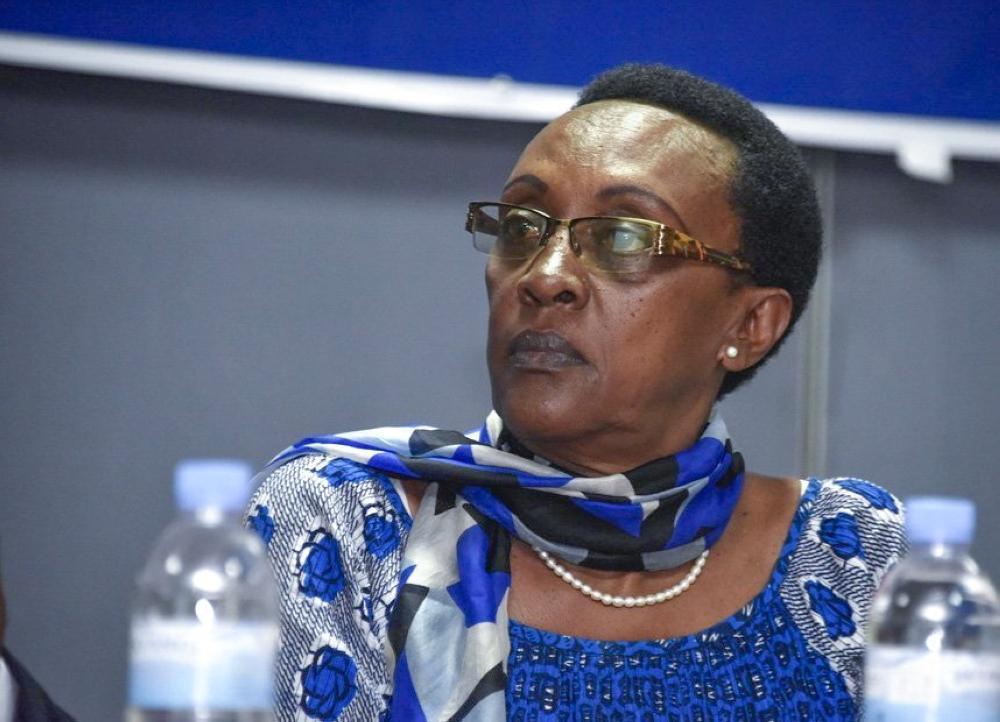Mweusi Karake
Africa-Press – Rwanda. My young sister Immaculee, her name’s sake, was the first to call me at 9a.m in the morning of October 9 to make the shuttering news. Then my phone started ringing from several friends. In less than an hour, I had received more than ten calls, and my WhatsApp was equally busy. Some, still in denial, wanted me to assure them that news of her death was just a malicious social media rumor. Unfortunately, I couldn’t confirm their hopes against hope. A former colleague, Aloys Badege, called me and started sobbing on the phone, crying, “Ingabire is dead! Ingabire is dead!” Rwandan men are not known for expressing their shock in tears, but there he was, weeping like a child. That’s how much she was revered.
I had last worked with Ingabire in June 1999, as a journalist — print media, radio, TV, you name it — and in journalism associations. Little did I know that more than 26 years later, so many people would still associate me with her. As if to confirm that connection, my daughter, who knew her since she was just nine years old and was very fond of her, sent me a message she had received. It read as follows: “Ingabire was passionate about accountability; she fought with style and a good sense of humour. Before that, she was a brilliant journalist; we will also remember her fiery articles in Imvaho Nshya, alongside those of Mweusi Karake, at a time when our national experiment was at a crossroads. You will be missed”.
I later learned that the tribute was from Jean Pierre Kimonyo. He is a PhD holder, an author, and the Regional Director of the Levy Mwanawasa Centre for Democracy and Good Governance, an institution of the International Conference on the Great Lakes Region (ICGLR). He is known for his critical appreciation rather than being a praise singer.
On reading the tribute above, I had a long debate with myself about whether or not to edit my name out when quoting it. As far as I am concerned, placing me on the same level as Mikii — as we fondly called her — feels like over-glorifying myself, and I did not want that. But, at the same time, removing my name felt as though I was unwilling to be identified with her. Faced with these two dilemmas, I chose to respect the decision of the tribute-payer. In any case, I am very proud to be associated with her, and I am sure many others feel the same way: women’s organizations, media houses, and rights activists, to mention but a few.
If Mikii had been consulted on when to die, I can swear she would have chosen this time of the year, October. It was on October 1, 1990, that Rwanda’s liberation heroes took the decisive step to free the country, fully aware that they could die, and die they did. The commander, General Fred Gisa Rwigema, fell on October 2, followed three weeks later by Majors Peter Bayingana and Chris Bunyenyezi. And, of course, there were countless unknown soldiers, heroes in their own right.
To paraphrase the famous Jamaican poet Claude McKay:
If she must die, let her not be like hogs,
Hunted and penned in an inglorious spot,
While round her bark the mad and hungry dogs,
Making their mock at her accursed lot.
If Mikii had been consulted on when to die, she would have chosen this very period. Even in her death, she died a winner, among heroes. For a hero she was. Had she been at the army front line, she would have died with the rank of a general. Indeed, she died a winner.
Mikii was born in Bujumbura, Burundi, in 1961, in what was then the Belgian colonial territory of Rwanda-Urundi, a name born of colonial arrogance, as they could not even call the land by its proper name. There were many colonial civil servants across the territory, but that was not the circumstance of her birth. No! She was born there because the Belgians, together with their PAREMEHUTU protégés groomed for puppet leadership, had begun the ethnic cleansing that would later culminate in the 1994 Genocide against the Tutsi in Rwanda.
She was born, raised, educated, and began her journalism career in Burundi, speaking Kirundi as her first language. Burundi was the country she knew. With a stable, well-paying profession she loved and excelled in, many would have expected her to stay until there was a soft landing, as others did. But in 1994, when Rwanda had hit rock bottom, she crossed the border without hesitation to play her part.
As Kimonyo aptly put it, it was “a time when our national experiment was at a crossroads.” Mikii jumped into the deep end. A brilliant journalist, she fought with courage, daring all who would listen.
I had the misfortune of being her boss. If she thought there was an urgent national issue that was not being addressed, she would jump into my office and speak to me in a disarming, amusing manner: “Ariko sha, shefu!” The word “sha” in Kirundi is apparently affectionate, but in classic Kinyarwanda it is used when addressing a junior, such as a child. On the other hand, “shefu” — meaning chief — is used for a boss. I often joked with her that she should choose between calling me “sha” or “shefu”, but not both! Having disarmed me with her charm, she would then express her grievances — and I knew immediately that I needed to save my skin. The issue would soon appear on the editorial agenda. Her quest for justice was insatiable. If I were to talk about her professional excellence, I would have to write an entire dissertation. But I cannot conclude without mentioning how much I enjoyed doing live radio interviews with her. When I moved from print media to head Radio Rwanda, I introduced a weekly live interview programme that put those in power to task. Our boss at ORINFOR, the media body overseeing government outlets, was very worried. Live debates had never been done since the inception of Radio Rwanda in 1962. I was launching a controversial programme, and to make matters worse, I included this “loose cannon” in the team. We shall be sacked, my boss warned me. But it was precisely that “loose cannon” in her that I was looking for, a daredevil!
At one point, I received a call from the Ministry of Information asking how, on earth, Ingabire could interrupt the President of the Republic. They informed me that it was not the first time she had done so, and I was politely advised to remove her from the programme. I equally politely agreed but by the time I left Radio Rwanda, in 1999, I had not implemented the request. The programme, Kubaza Bitera Kumenya (to ask is to know), became such a hit that my bosses received an unbelievable complaint. It was from from churches! They said Radio Rwanda had stopped Christians from attending Sunday Mass and worship because congregants preferred to stay home and listen to our heretical team.
Mikii was never driven by money; she was driven by the causes she believed in. Years later, she left her government media role — which she had helped rebuild — frustrated by attempts to tame her and disheartened by the loss of colleagues like me, who had often encouraged her “criminality.” She then joined UN Women in Rwanda, believing she was going to fight for women’s rights. But she couldn’t stomach the bureaucracy. She had naively thought she could walk into her boss’s office and say, “Ariko sha, shefu…” — as she used to say to me — and get things moving. She eventually left the well-paying job and freelanced for a short while. But she was too talented to stay idle for long. Soon, in 2021, she was appointed Chairperson of the Board of Directors of Transparency International Rwanda. Finally, she could speak without hindrance. And she didn’t just chair the board; she led from the front. She was a field commander, fighting tooth and nail against injustice, particularly injustice against women and girls.
Abused women often came to her instead of going to the police, knowing that no bureaucracy would stand in her way. She listened to them, and once convinced of their plight, she took the matter head-on. She worked closely with legal aid organizations to ensure the vulnerable had lawyers to represent them. She would walk into prosecutors’ offices, just as she once walked into mine, demanding to know why certain cases were taking too long. Everyone knew she feared no office in the land. She became a legend among women and girls. She also took on a few cases of abused men who had swallowed their “African pride” and feared to come forward — something rare, as most would say, “Which man complains to a woman that his wife beats him up?” Teenage boys were a bit luckier; their mothers often brought their cases on their behalf.
She condemned the immorality imported from Western media, such as pornography and the growing trend of girls displaying their nakedness online. She would point out that those women in Western media are paid more than African presidents, that what they do is acting — and, above all, that such behaviour is accepted in their societies, not ours.
She exposed corruption regardless of who was involved. Traffic Police appeared year after year as the most corrupt institution in the country. She described their excessive power as if one officer carried out the entire justice system. He stops you, decides you are wrong, charges you, fines you, and even collects the fine! In short, “he is the arresting officer, the prosecutor, the judge, and the bailiff.” The appeals process was prohibitively cumbersome. It would require a sane driver to spend two days chasing money that he or she works hard to earn in an hour or less! She ridiculed the system with the kind of dry humour alluded to earlier by Kimonyo. The police did not take it kindly, but their bosses were cautious about attacking her because they knew the consequences. The ordinary police officers on the road, however, did not express the same caution.
At one point, her driver was stopped by the police and did what most drivers do — tried to negotiate. One officer looked at him and laughed, “We might have been more lenient if you weren’t wearing that T-shirt!”
Local authorities were not spared either. At the national level, she was very vocal during the annual Umushyikirano — the National Dialogue Council — an event chaired by the President that brings together citizens and leaders to discuss key national issues. Her views were highly regarded and often found their way into the conference’s resolutions and recommendations. She truly made a significant contribution.
Mikii was not motivated by money or fame. If she had wanted either, she could have gone into politics. I’m certain that if she had run for one of the two seats reserved for women representatives, she would have sailed through. But she didn’t. It wasn’t like her to wait for scheduled times or formal debates. She had no patience for formalities — her impulse wouldn’t tolerate that. She preferred to follow her instinct.
I could go on and on, but I know many others wish to pay their tributes. The nation mourns a hero, but as a Tuscarora proverb says, “The legends are not dead who live in the hearts they leave behind.”
Source: The New Times
For More News And Analysis About Rwanda Follow Africa-Press






